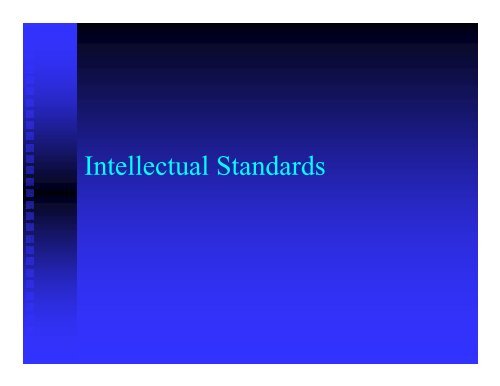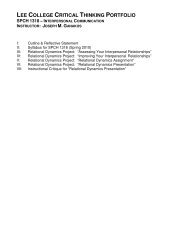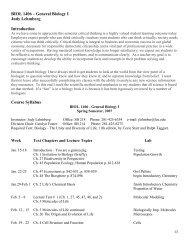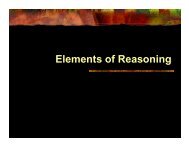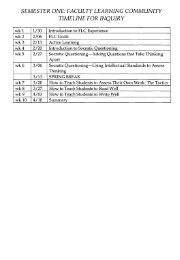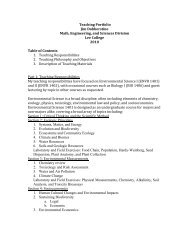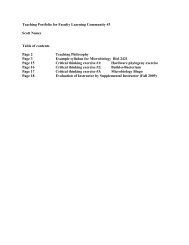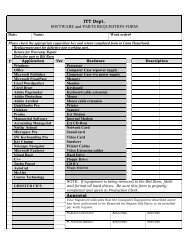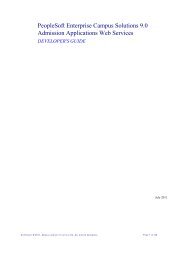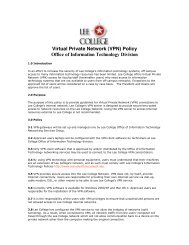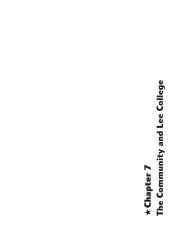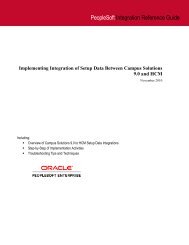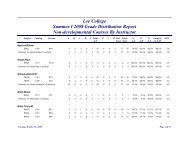Intellectual Standards - Lee College
Intellectual Standards - Lee College
Intellectual Standards - Lee College
Create successful ePaper yourself
Turn your PDF publications into a flip-book with our unique Google optimized e-Paper software.
<strong>Intellectual</strong> <strong>Standards</strong>
What standards do you think are important when<br />
evaluating your students reasoning (writing,<br />
speaking, reading)?<br />
In other words, what criteria i do you use when<br />
evaluating an essay or article?<br />
Join with the person sitting next to you and make a<br />
list of the standards you think are important<br />
when evaluating the quality of a person’s<br />
reasoning?
The Underlying Principles of Critical Thinking<br />
<strong>Standards</strong>ElementsTraits<br />
The S d d<br />
clarity precision<br />
must be applied to<br />
accuracy<br />
significance<br />
relevance completeness<br />
logical fairness<br />
breadth depth<br />
The Elements<br />
purposes inferences<br />
<strong>Intellectual</strong> Traits<br />
questions concepts<br />
intellectual lhumility<br />
points of view implications<br />
information assumptions<br />
intellectual perseverance<br />
intellectual autonomy<br />
intellectual integrity<br />
confidence in reasoning<br />
intellectual courage<br />
intellectual empathy<br />
Fair-mindedness<br />
as we develop
Red/green<br />
thinking<br />
System 2: Red Thinking:<br />
Higher order executive<br />
functioning.<br />
i<br />
Thinking that analyzes,<br />
assesses and improves green<br />
Thinking.<br />
System 1: Green Thinking:<br />
Instinctive, automatic,<br />
spontaneous thinking.<br />
Unconsciously guided
Green Thinking<br />
Unconscious Mixture Of High Quality<br />
And Low Quality Thinking<br />
Spontaneous Subconscious Uncontrolled<br />
Impulsive Self protecting Unanalyzed<br />
Reflexive<br />
Self validating<br />
Includes ideas that are valid, as well as nonsense, confusion,<br />
stereotypes, prejudices. The key is that we cannot distinguish<br />
the difference between high and low quality thought in green<br />
thinking mode.<br />
Green thinking goes without assessing itself.
Red Thinking<br />
Red Thinking stops and assesses itself before going forward.<br />
Disciplined<br />
Seeks the truth<br />
Self assessing<br />
Critical Thinking<br />
Self correcting<br />
Probing<br />
In red thinking mode, we actively work to eliminate<br />
prejudices, biases, dysfunctional thinking from our<br />
thinking. We actively work on our thinking.<br />
We rigorously apply intellectual standards to our thinking.
Understanding <strong>Intellectual</strong><br />
<strong>Standards</strong>
One of the most<br />
fundamental goals in<br />
teaching<br />
Accurate and consistent<br />
student self assessment<br />
Fundamental Goal in Teaching
<strong>Standards</strong> of Reasoning<br />
Clarity:<br />
Accuracy:<br />
Precision:<br />
Relevance:<br />
Understandable, the meaning can be grasped<br />
Free from errors or distortions, true<br />
Exact to the necessary level of detail<br />
Relating to the matter at hand<br />
Depth:<br />
Containing complexities and interrelationships<br />
Breadth:<br />
Logic:<br />
Involving multiple viewpoints<br />
The parts make sense together, no contradictions<br />
Significance:<br />
Focusing on the important, not trivial<br />
Fairness:<br />
<strong>Standards</strong> of Reasoning<br />
Justifiable, not self-serving (or egocentric)
CLARITY<br />
1. State: give a brief explanation<br />
2. Elaborate: expand on your explanation<br />
3. Exemplify: give a concrete example<br />
4. Illustrate: use metaphor, analogy, picture
Clarify the concept of critical<br />
thinking<br />
• Critical thinking is…<br />
• In other words…<br />
• For example…<br />
• To illustrate…
Clarify the <strong>Standards</strong><br />
I would define intellectual standards in<br />
the following way…<br />
In other words…<br />
For example…<br />
To illustrate…
Taking initial ownership<br />
of the standards<br />
Working in pairs using Concepts and Tools<br />
guide – pp. 8-9, 10<br />
Person A – clarity, accuracy, precision,<br />
relevance<br />
Person B – depth, breadth, logic, fairness<br />
Read in order to teach your concepts to your<br />
partner. When teaching, be prepared to point<br />
out how each standard applies to your work.
Discuss your understanding of the<br />
standards. Then answer these<br />
questions:<br />
• Why and how are these standards important in<br />
teaching?<br />
• Why and how are they important in human life?<br />
• How do they relate to your content?<br />
• What can you do to better foster student use of<br />
these standards, to help students construct them<br />
into their thinking and regularly use them?
<strong>Intellectual</strong> <strong>Standards</strong> and<br />
Teaching<br />
Make a list of the standards that are used in<br />
your discipline.<br />
Then make a list of ways in which you can<br />
better bring the intellectual standards into<br />
instruction.
What is Your Philosophy of<br />
Education?<br />
• B Questions C<br />
A observes<br />
• C Questions A<br />
B observes<br />
• A Questions B<br />
C observes
What is the difference/relationship<br />
between education and the<br />
concepts of socialization,<br />
indoctrination, and training?<br />
• C questions A<br />
B observes<br />
Focus questions on depth and clarity.
Focusing on a key concept in<br />
your course<br />
Explain in writing i the most fundamental<br />
concept in one course you teach.<br />
State, elaborate, exemplify
Focus on a key concept in your<br />
course.<br />
• AQ Questions B<br />
C observes
Instead of <strong>Intellectual</strong><br />
<strong>Standards</strong>, d what are the<br />
standards d people most<br />
often use in their<br />
thinking?
<strong>Standards</strong> Typically<br />
Used in Thinking<br />
“It’s true because I believe it” (innate egocentrism)<br />
“It’s true because we believe it”<br />
(innate sociocentrism)<br />
“It’s true because I want to believe it”<br />
(innate wish fulfillment)<br />
“It’s true because I have always believed eved it.”<br />
(innate self-validation)<br />
“It’s true because it is in my selfish interest to<br />
It s true because it is in my selfish interest to<br />
believe it.” (innate selfishness)
More Non-intellectual <strong>Standards</strong><br />
• It’s true because someone in a position of<br />
perceived power (or authority) said it is<br />
true.<br />
• It’s true because it’s beyond my (our)<br />
ability to fully understand it.
Non-Critical Thinking <strong>Standards</strong><br />
• Fun<br />
• Exciting<br />
• Feels good<br />
• Attention-getting<br />
g<br />
• Popular<br />
• Patriotic<br />
• free<br />
• Chic<br />
• Spontaneous<br />
• Advantageous<br />
• Easy<br />
• Beneficial to me<br />
• Deeply moving/felt
Typical student beliefs.<br />
• Learning should be fun.<br />
• Learning should be easy.<br />
• If I do what the teacher says, that’s all that matters.<br />
Learning means doing what the teacher says.<br />
• All I need to do is the absolute minimum to get the grade.<br />
• I shouldn’t have to waste my time learning anything I can’t<br />
use.<br />
I believe that learning biology is a waste of my time.<br />
• Cheating to get by is fine because all I need is the piece of<br />
paper (the college degree) to get a job anyway.
<strong>Intellectual</strong> <strong>Standards</strong> represent<br />
possible questions<br />
• See handout
Clarification/Precision<br />
Is welfare justifiable?<br />
Is it ethically justifiable for the government to<br />
provide goods and services to persons who have<br />
not earned them, and by so doing, taking resources<br />
from those who have earned them?<br />
Do citizens of a community have an ethical<br />
responsibility to provide for the basic needs of<br />
people in the community who are unable to meet<br />
those needs themselves?<br />
If we provide free goods and services to people, p will<br />
we discourage them from learning to provide for<br />
themselves?
Clarification/Precision<br />
Should I declare bankruptcy?<br />
Given my financial condition, what are the<br />
short and long term implications i of<br />
declaring bankruptcy, or deciding against<br />
it?<br />
What will my family and friends think of me<br />
if they find out I have declared bankruptcy?<br />
Do I have an ethical responsibility to avoid<br />
declaring bankruptcy?
The Underlying Principles of Critical Thinking<br />
<strong>Standards</strong>ElementsTraits<br />
The S d d<br />
clarity precision<br />
must be applied to<br />
accuracy<br />
significance<br />
relevance completeness<br />
logical fairness<br />
breadth depth<br />
The Elements<br />
purposes inferences<br />
<strong>Intellectual</strong> Traits<br />
questions concepts<br />
intellectual lhumility<br />
points of view implications<br />
information assumptions<br />
intellectual perseverance<br />
intellectual autonomy<br />
intellectual integrity<br />
confidence in reasoning<br />
intellectual courage<br />
intellectual empathy<br />
Fair-mindedness<br />
as we develop
Clarify
Skilled Learner
Unskilled Learner


